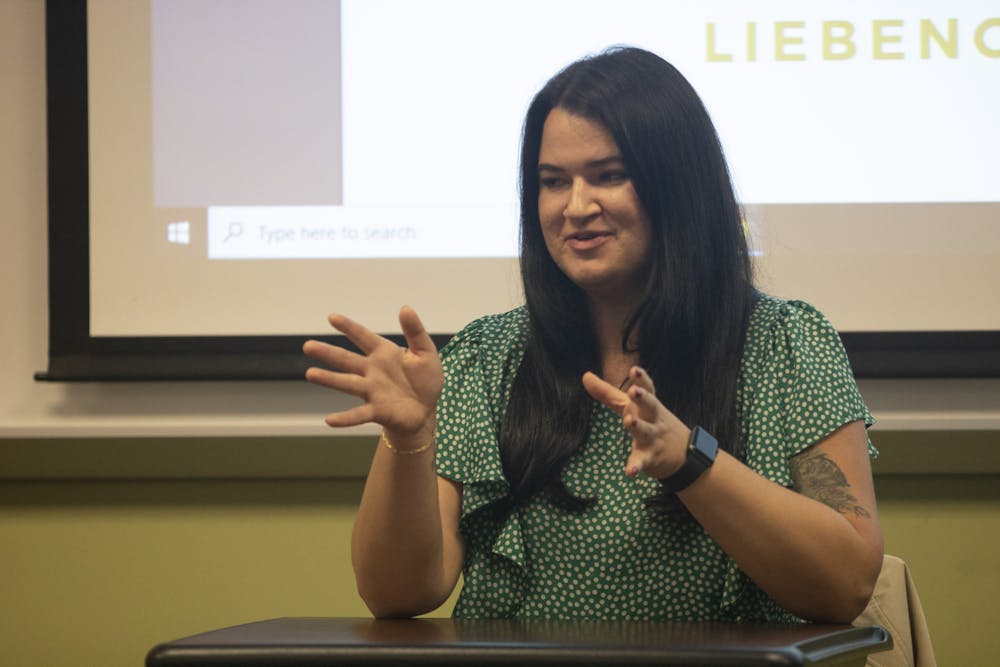For earth week, the office of sustainability gets a lot of attention for its events. But, Elon’s office of sustainability plans events throughout the year in collaboration with other student organizations, Kelly Harer, associate director of sustainability for education and outreach, said.
The goal of collaborative events is to help make sustainability accessible across campus, Harer said.
“Part of the reason we collaborate is to try to get other students who might not be focused academically on environmental studies,” Harer said. “We certainly think that sustainability encompasses a lot of different majors and a lot of different passions around campus.”
A system Elon uses to measure its sustainability efforts is the Sustainability Tracking, Assessment and Rating System. This is a self-reported measure for colleges and universities to use to track sustainability.
Based on data from Elon’s submission Feb. 11, 2022, which is valid until March 16, 2025, Elon received a silver rating, earning 59.12 points out of 100.
The points are broken down in different categories across academics, engagement, operations, planning and administration and innovation and leadership. One of the areas where Elon lost the most points was under the waste category, where Elon received 2.89 out of 10 points.
In 2020, Elon generated 2,099 tons of waste compared to the baseline year of 2004 where Elon generated 1,282 tons of waste. The university did recycle 183 tons, composted 309 tons, donate or re-sold 11.72 tons and disposed in solid waste landfill of incinerator 1,595 tons.
To help address this area, Harer said Elon created a waste reduction master plan and hired someone to focus on waste reduction. The last master plan was created in 2015, with no specific benchmarks and now the campus is in the process of creating a 2025 sustainability master plan. A main goal is to become carbon neutral by 2037, and there will likely be benchmarks and timeline goals to help achieve that in this master plan, Harer said.
While he sees room to improve, senior Matthew Flacksenburg, the sustainability intern for the office, is proud of the work the university has done for sustainability. Elon has a number of initiatives focused on sustainability, such as recycling and composting, but not everyone is participating in these initiatives, Flacksenburg said.
“I think one thing that we could do to improve is just increasing our engagement with those tools because we have a lot of the infrastructure to do sustainable stuff,” Flacksenburg said. “But a lot of the times people don't know about it, or people don't know how to interact with it properly.
Another large area of Elon’s carbon emissions is from energy use. To help reduce Elon’s energy use, all new buildings are required to have a Leadership in Energy and Environmental Design silver certification. This means that Elon’s buildings are required to be designed to be more energy efficient such as with its light system and heating and cooling systems, Harer said. Elon also has an energy conservation program where in all of Elon’s academic buildings the heating and cooling is turned off between 7 p.m. and 7 a.m.
Another issue Harer hopes to avoid is greenwashing. This is something she combats through addressing misinformation. She does not want to claim that Elon does more to promote sustainability than it actually does.
“A big one is people often think that the solar panels out at Loy Farm are coming on campuses,” Harer said. “I give tours of those solar panels, and I always make sure that people know it’s going to the local grid, probably some electrons are coming over here, but it's not coming on on campus. We can't track that or anything like that.”
Harer works to help inform students about the sustainability efforts Elon does participate in. One way the Office of Sustainability works to do this is through eco-reps, who are peer educators that host events and teach students about sustainability. Flacksenburg oversees the eco-rep program and has been planning events for earth week. This week there will be a pop-up swap shop, a yoga event and others hosted by different student organizations across campus, Flacksenburg said.
Through the programs happening this week and after, Harer hopes students recognize the work that is being done to improve sustainability.
“Just making sure people have all of the information and recognizing that we certainly aren't perfect in sustainability,” Harer said. “We are doing what we can, doing our best, but there's a lot of work to be done.”


